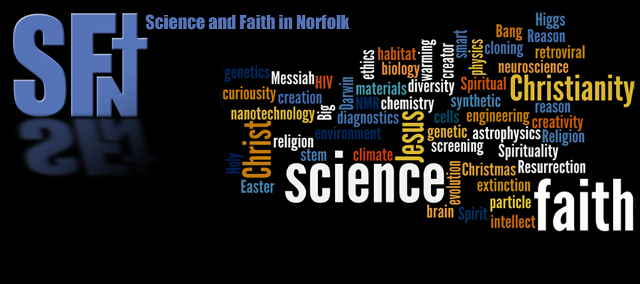
'God in the science lab' topic of Norfolk event
Over sixty people gathered to hear Dr Ruth Bancewicz reflect on how science helps to satisfy human curiosity about the workings of the natural world and how it also points towards the deeper questions about our existence.
Report by Patrick Richmond & Nick Brewin
Ruth Bancewicz spoke at the Science and Faith in Norfolk meeting on March 5. She presented three short videos of interviews with working scientists who are also people of faith. She works at the Faraday Institute for Science and Religion in Cambridge and previously helped to develop the “Test of FAITH” materials for use in schools and churches.
Each scientist that she interviewed highlighted some interesting and challenging topics at the interface of science and faith. She noted that Science and Faith typically explain the mysteries of the natural world in different but complementary ways. Scientists try to discover the mechanisms and laws that underpin the workings of nature. On the other hand, Christian faith is more concerned with “Why?” things exist: - what is the purpose of their being so? As an illustration of this distinction, we can think about a kettle boiling: this might be explained, scientifically, in terms of energy, temperature, and the properties of water; on the other hand, it could be explained, philosophically, in terms of purpose: - in order to make nice a cup of tea. Both explanations have their place.
A life-friendly universe
The first of Ruth’s interview was with Stephen Freedland, an astrobiologist interested in the evolution of the genetic code. He pointed to the fact that the laws of physics and chemistry that underpin our universe seem to be precisely fine-tuned for the evolution of life. Because we can now see how life evolved, does this mean that we don’t need to believe in a creator God? Or should we believe that God has made our wonderful universe to be so fruitful? With the guidance of Dr Bancewicz, the audience divided into small groups to discuss and to raise their own questions. For example, if there is intelligent life in other solar systems, how could this relate to our own experience of Christ and salvation? Dr Bancewicz noted that CS Lewis and others have offered several ways in which a Christian faith could accommodate the possibility of alien forms of intelligent life.
Order from randomness
Another interview was with Dr Rhoda Hawkins, a biologist studying the growth and organisation of structural filaments in living cells. At one level, this process seems to be almost random although it results in cells that have a coherent structure and function. She asked how God can create a “purposeful” universe using random processes based on the unpredictability of quantum mechanics, atomic behaviour, etc. Her answer to this perplexing question is that the random nature of processes at one level, for example, the molecule or the individual cell, becomes an intrinsic component of organisation at a higher level. The higher level of organisation has “emergent properties” that are more ordered and predictable than the random behaviour of its component parts. As an example, individual air molecules move in random ways, but heating air in a room predictably increases the temperature of the room as a whole.
A purposeful world
Jeff Hardin researches the development of sea urchins and worms, discovering processes that are similar enough to those in humans to be helpful to medical research. In his video, he wanted to explore the concept of a purposeful world. He explained that he, personally, had faith in the purposes of God’s universe, which includes generating creatures like us capable of developing a relationship with its creator. On the other hand, and at a much lower level, some agnostic scientists consider that our only evolutionary purpose is simply to propagate our own DNA. In common with most biologists, Prof Hardin did not want to suggest that God needs to interfere with or tweak the mechanisms of the world for life to evolve. Rather, he believed that God has imbued creation with rich, complex capabilities of its own.
Dr Bancewicz used these examples to show how scientists who are Christians deal with matters that raise questions about their faith. These questions go beyond the merely scientific, mechanistic issues that they deal with professionally, causing them to wonder about the purposes that might be served by the existence of the universe itself.
All welcome to next meeting - June 25
The open lecture and discussion was organised by Science and Faith in Norfolk. The next meeting in this series will be on Monday 25th June (7.30 – 8.45 pm) at Trinity Meeting Place, Essex St. Norwich NR2 2BJ. Dr Jeremy Lindsell will give a talk entitled “Conservation and Hope for the Earth: A Christian understanding of planetary stewardship”. This will explore the impact of climate change, environmental pollution and the mass extinction of species.
For further information contact Professor Nick Brewin (07901 884114); sfnorfolk1@gmail.com; https://sites.google.com/site/scienceandfaithinnorfolk/